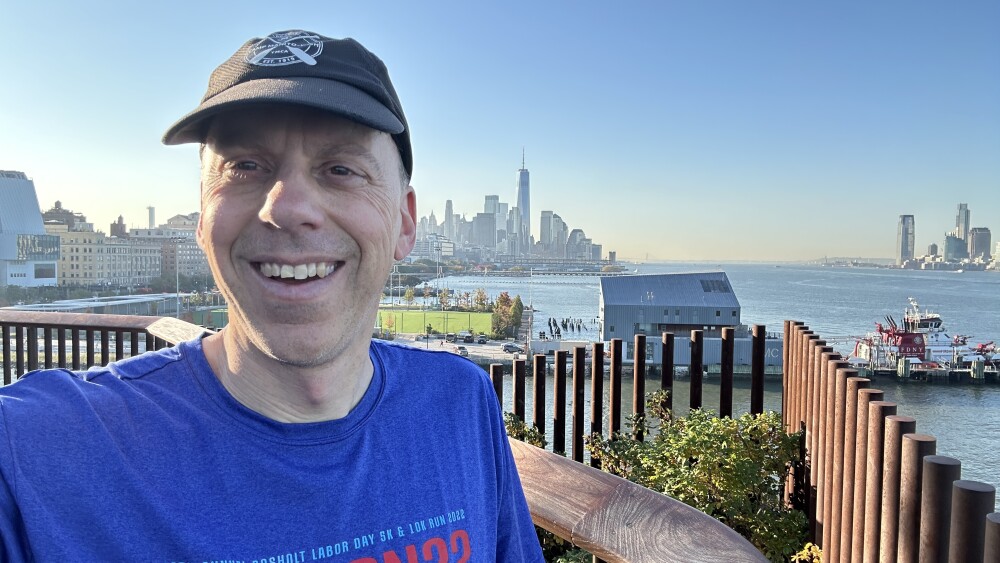The start of the new year is a popular time to start a new health and fitness regime and the social media-friendly #75Hard challenge is receiving a lot of attention in early 2025. The Guardian and Fast Company have recently explained 75 Hard to their readers to capitalize on trending interest in the twice-daily workouts, drinking a gallon of water and reading 10 pages of non-fiction every day.
I went on to complete 75 Hard after writing these halfway observations. I was initially informed and inspired by EMS leader and speaker Charles Blankenship described his personal health and wellness journey at the 2024 Pinnacle EMS conference. Charles’ discussion of following the 75 Hard challenge caught my attention and I decided to give it a try.
75 Hard challenge routine and components
The 75 Hard challenge is a daily program that involves completing specific tasks consistently for 75 days. The 75 Hard challenge is not just a fitness routine; it is a program designed to test your mental discipline and boost your physical fitness. The daily components of the 75 Hard challenge include:
- Two 45-minute workouts: One must be outdoors, regardless of weather
- Drink one gallon of water: Hydration is crucial for both physical and mental performance
- Follow a diet: Stick to a nutrition plan of your choice without any cheat meals
- Read 10 pages of a non-fiction book: Focus on personal development by reading each day
- Take a progress picture: Document your journey daily to visually track progress
Halfway observations on 75 Hard
If you miss a day, you go back to day 1. After several short streaks, I am now more than 45 days into 75 Hard. This is what I have learned so far.
1. Consistency is key
The challenge has been a vehicle for me to stay consistent and focused. Showing up each day is helping me see and feel physical health improvements.
2. Prioritize sleep over alcohol
January 1, 2024, well before starting 75 Hard, I stopped drinking alcohol to improve my sleep quality. My smartwatch confirms that eliminating alcohol has had a noticeable positive impact on my sleep. As a long-distance runner, prioritizing sleep over alcohol is improving my energy and endurance.
Sleep better | ‘Why We Sleep’: The book every medic needs to read
3. Hydration is challenging but necessary
Drinking a gallon of water a day has been the most difficult part of 75 Hard for me. Off-loading a gallon of water is even more difficult and if I don’t pace my water consumption, my sleep is disrupted with frequent trips to the bathroom. Each day, I aim to hit my one-gallon goal by 7 p.m. to reduce late-night trips to the bathroom.
4. Early morning workouts set the tone
By waking up at 4:45 a.m., and beginning my first workout by 5:15, I get a head start on the day and feel more accomplished as my workday begins. My morning workout usually involves running, walking or biking. Fitting in the second workout after work can be challenging, but mixing in activities like walking, hiking, biking and playing pickleball with family and friends helps me stay on track.
5. The value of small habits
Incorporating small, consistent habits leads to noticeable improvements. The first non-fiction book I read during this challenge was “Tiny Habits”, by BJ Fogg. The book focuses on how small, easy-to-do behaviors can create lasting changes. Following the “Tiny Habits” approach has led to welcome and noticeable changes to my house-cleaning routine, exercise and diet.
Here are the books I have read so far:
- “Tiny Habits”
- “The Seven Principles for Making Marriage Work”
- “How to Retire with Enough Money”
- “The Subtle Art of Not Giving a F\ck”
Read | 4 books to make you a better EMS leader
Resilient 50
An alternative to the 75 Hard challenge is Aaron Zamzow’s Resilient 50. Zamzow, the founder of Fire Rescue Fitness, challenges first responders to select five of 10 habits, ranging from daily exercise, to steps, to water consumption, to reading, to complete each day for 50 days. Learn about the Resilient 50 on the Better Every Shift podcast and the Fire Rescue Fitness website.
Conclusion
I am looking forward to finishing the 75 Hard challenge and plan to maintain at least two of the components, reading at least 10 pages per day of non-fiction and two daily workouts. Have you tried 75 Hard? What’s been your experience? What are your lessons learned for other first responders? Share with us at editor@ems1.com.
--
Editor’s note: Andy Frisella, the founder of the 75 Hard challenge, recently made misogynistic and violent comments about female police officers, leading to St. Louis and St. Louis County police departments cutting ties to Frisella and his companies. My participation in the 75 Hard challenge began before his comments and my participation is in no way an endorsement of Frisella or his shameful views.




